In the realm of politics, it often seems that victories are relished too soon, only to be tainted by the sobering reality lurking just beneath the surface. Take, for instance, the recent budget approvals celebrated by the Washington state legislature. On the surface, two versions of an operating budget seemed like a feat worth cheering. Yet, the moment Governor Bob Ferguson swiftly dispatched them back to the drawing board, the euphoria evaporated like morning mist. This sufficiency, paraded by lawmakers, stands as more than just a setback; it is a wake-up call to the realities of modern governance.
Amidst the chaotic landscape of modern state budgeting, Ferguson’s confrontation presents two substantial red flags. For one, the two proposed budgets relied heavily on a wealth tax, a fiscal strategy that not only embodies a shift towards economic interventionism but also invites immediate legal challenges that could jeopardize budgetary sustainability. The propensity for government to lean on such untested revenue sources reflects a lack of vision in fiscal planning. If a wealth tax is viewed as an innovative solution, it might merely be an escape route away from the larger issues at hand.
The Cold, Hard Numbers
The reality, as stated by Ferguson, screams of an era defined not by replete coffers but bleeding deficits. With a projected $16 billion shortfall looming over the next four years, courtesy of dwindling revenue forecasts and cuts to federal aid, Washington State stands teetering on the edge of a financial abyss. It isn’t merely an economic inconvenience; it is an apocalyptic narrative prepared to unfold if immediate, decisive action isn’t taken.
The profound dependency of Washington’s budget on federal funding—a staggering 28%—exposes the fragility of fiscal sovereignty. Such dependency becomes particularly perilous given the volatile landscape of federal funding, which Ferguson categorically termed as a “five-alarm fire.” His insistence on not adopting an all-cuts budget is commendable, yet one has to wonder: where is the proactive strategy to insulate the state from these looming financial storms? Stubborn reliance on certain kinds of revenue assumes an economy free of turbulence, a notion increasingly far from reality.
What’s at Stake? The Importance of Core Services
Not only should Ferguson’s cautionary approach be supported, it should be celebrated for its grounding in practical governance priorities. Preserving the rainy-day fund—a cornerstone for weathering economic instability—should be a non-negotiable. Straying into the realm of blissful ignorance by depleting reserves would be a betrayal of the very citizens lawmakers are meant to serve.
Ferguson correctly identified the necessity of prioritizing core services and education over speculative fiscal frameworks. Even amidst budget constraints, investment in K-12 education must not suffer; it is, after all, the bedrock of future prosperity. In spite of the potential for cuts, it’s essential to engage in conversations about community impact and the very essence of what governance should accomplish.
Beyond Band-Aid Solutions: Embracing Realistic Revenue Projections
It’s imperative that lawmakers confront the stark need for realistic revenue projections free from fanciful dreams about windfall taxes. The fervor for a wealth tax, touted as cost-effective and innovative, should signal a time to recalibrate priorities. The core challenge of developing a sustainable budget lies not in chasing after idealistic funding sources, but in acknowledging and building policies that resonate deeply with the state’s fiscal identity.
Crafting sound budgets involves more than simply drafting checks; it requires an astute awareness of economic reliability and acknowledgment of the fundamental reality: taxpayers deserve fiscal stewardship that reflects stability, not potential for legal backfire or drastic service cuts. Recognizing this need is the first step in re-envisioning a state budget that accurately anticipates the fiscal storms ahead, rather than reacting in desperation.
In an age where economic literacy is becoming increasingly vital, Washington State’s budgetary turmoil serves as a critical case study. Lawmakers must cease to take the easy way out; the time has come for serious, conservative fiscal thinking that prioritizes long-term sustainability over quick fixes.


Leave a Reply